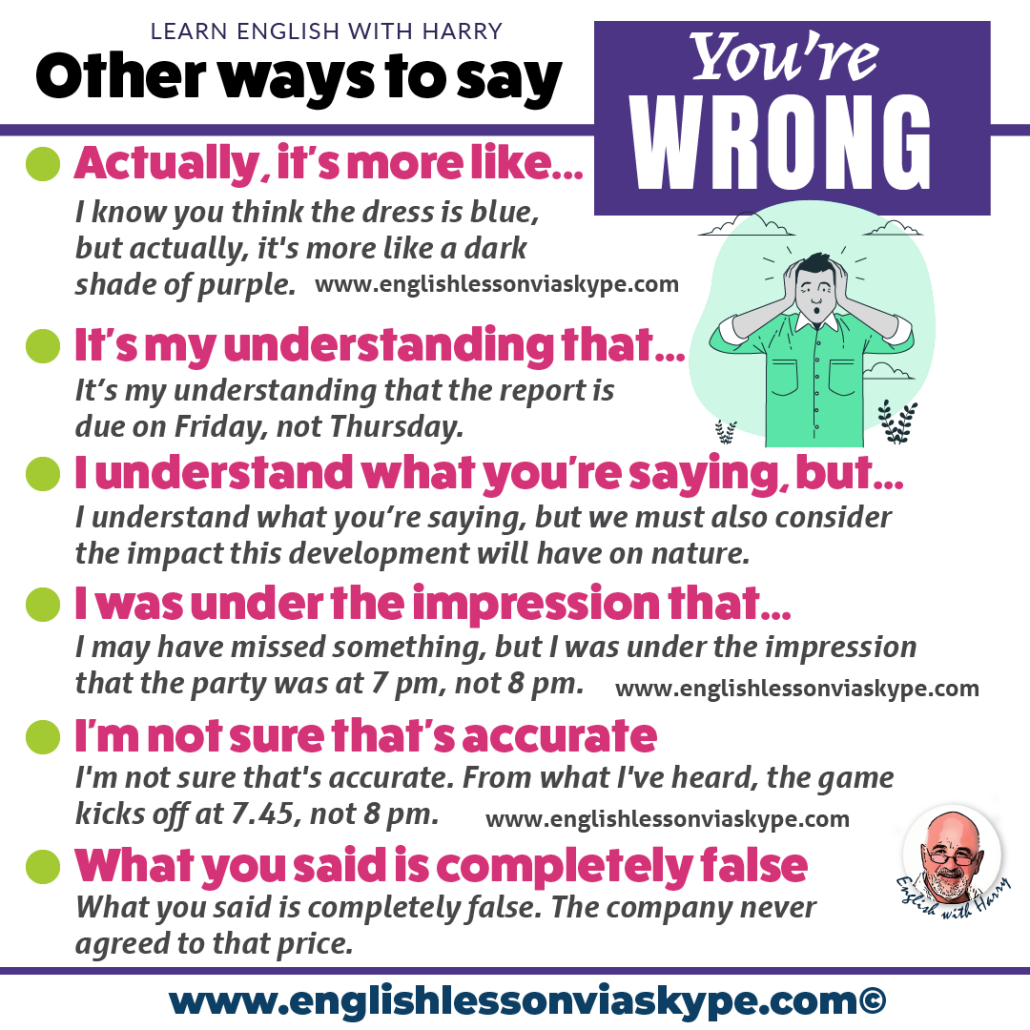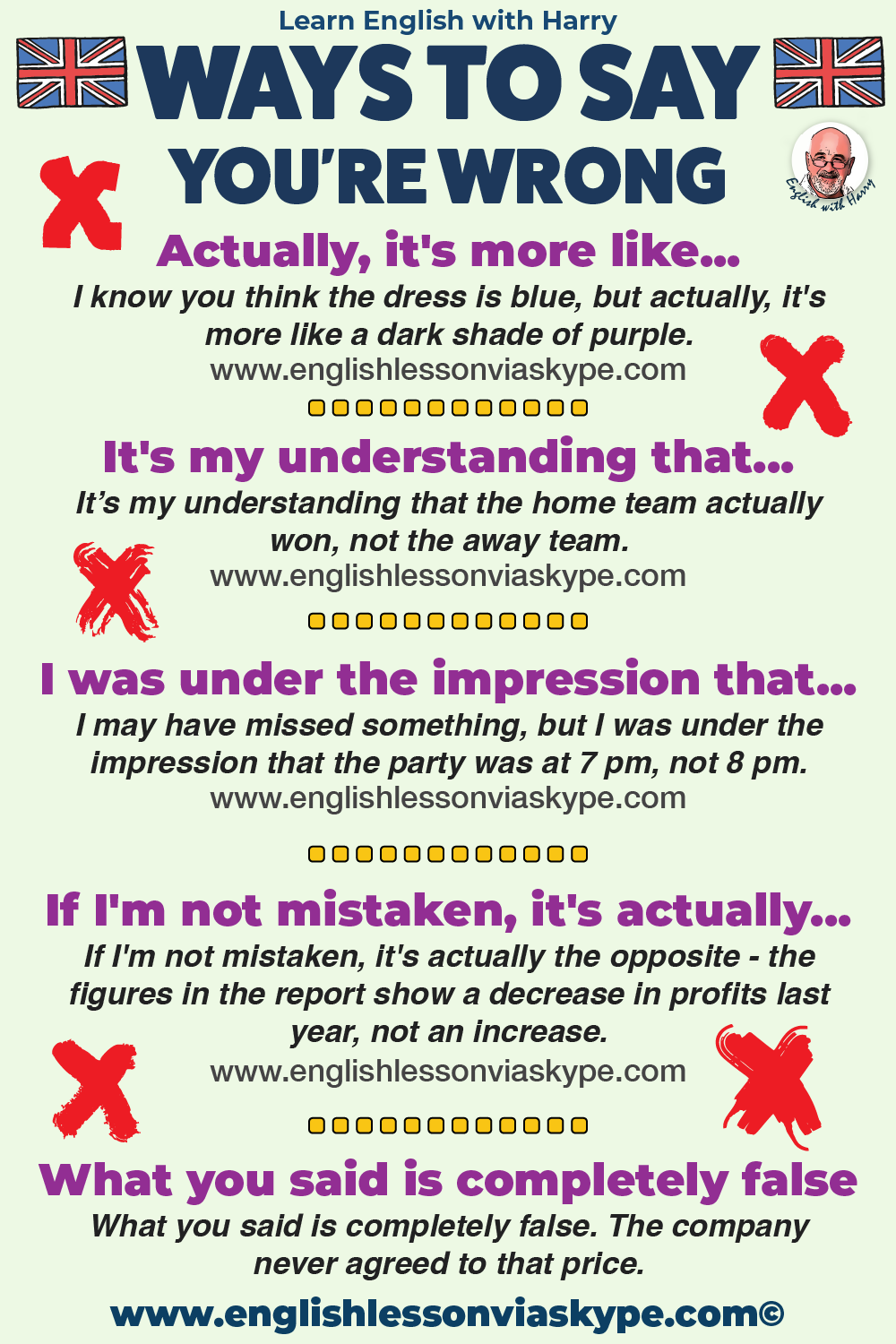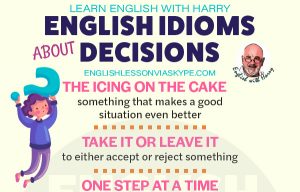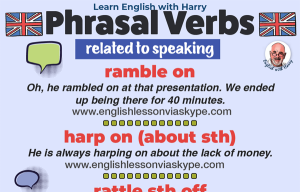Learn ways to say “You’re wrong” in English. In this lesson, we’ll explore advanced English alternatives that you can use in your everyday conversations. By using these alternatives, you can improve your speaking skills and sound more like a native speaker.
By mastering alternative ways to say “You’re wrong,” you’ll increase your vocabulary and become more confident in English. Learn practical techniques to improve your speaking skills and communicate better in English.
Listen to the podcast Speak Better English with Harry or watch it on YouTube at Learn English with Harry. englishclass101
List of English phrases
ways to say you're wrong in English
Harry
So in this advanced English lesson where we will focus on improving your speaking skills, specifically on how to politely inform someone when something is wrong.
Our main focus will be on expressing disagreement or pointing out someone’s mistake in a polite manner. These English phrases will be useful for your everyday conversations and daily communication.
improve english on a budget
Online English Courses from €7.99
I believe you may have misunderstood/misinterpreted that
Meaning: use it to say that there might be an error in their understanding without directly accusing them
Example:
I believe you may have misunderstood the directions. You were supposed to apply the red paint first.
I think there may have been a misunderstanding
Meaning: the mistake may have been due to a communication issue rather than a fault of the other person
Examples:
I think there may have been a misunderstanding about the deadline for the project, as you thought it was due next week.
I think there may have been a misunderstanding. The meeting was for today at 2 o’clock, not tomorrow.
I think there may have been a misunderstanding. My birthday is on 5th July, not 7th May.
ways to say you're wrong in English

Actually, it’s more like…
Meaning: gently correct the other person’s statement without making them feel embarrassed or offended
Examples:
I know you think the dress is blue, but actually, it’s more like a dark shade of purple.
Actually, it’s more like a 20-minute walk, not 30 minutes.
I’m sorry, but I don’t think that’s quite right
Meaning: you recognise what the other person said, but you don’t agree with it
Examples:
I’m sorry, but I don’t think that’s quite right. We need to double-check the information.
I’m sorry, but I don’t think that’s quite right. The store closes at 9 pm, not 10 pm.
I understand what you’re saying, but…
Meaning: you are listening to their point of view while politely correcting their error
Examples:
I understand what you’re saying, but we must also consider the impact this development will have on nature.
I understand what you’re saying, but I think it’s actually pronounced ‘karaoke’, not ‘kar-ee-oh-kee’.
I understand what you’re saying, but I think it’s actually pronounced ‘Uruguay’, not ‘U-ru-gii’.
book your trial English Lesson
It’s my understanding that…
Meaning: lets you share your own point of view while still respecting their opinion
Examples:
It’s my understanding that the home team actually won, not the away team.
It’s my understanding that the report is due on Friday, not Thursday.
It’s my understanding that the report is due on Thursday, not Friday. It’s a Bank Holiday weekend.
Perhaps we could double-check the facts on that
Meaning: both parties should check the facts before deciding who is right or wrong
Examples:
Perhaps we could double-check the facts on that. I believe there may have been an error in the calculations.
Perhaps we could double-check the facts on that before making a final decision.
I was under the impression that…
Meaning: you are being humble and suggest that the mistake could be yours instead of the other person’s
Example:
I may have missed something, but I was under the impression that the party was at 7 pm, not 8 pm.
ways to say you're wrong in English

If I’m not mistaken, it’s actually…
Meaning: you might be mistaken, but you want to share your opinion
Examples:
If I’m not mistaken, it’s actually the opposite – the figures in the report show a decrease in profits last year, not an increase.
If I’m not mistaken, it’s actually the second turn on the right, not the first.
I’m not sure that’s accurate
Meaning: the way to express doubt in a polite way
Examples:
I’m not sure that’s accurate. From what I’ve heard, the concert starts at 7 pm, not 8 pm.
I’m not sure that’s accurate. I think we’re going to get two extra days’ holiday, not one.
I’m not sure that’s accurate. From what I’ve heard, the game kicks off at 7.45, not 8 pm.
I understand your point, but I think it’s more like this…
Meaning: we understand what the other person is saying, but we have a different opinion
Examples:
I understand your point, but I think it’s more accurate to say that we need to submit the report on Friday, not Thursday.
I understand your point, but in reality, we really need to launch this product at the middle of spring.
speak better English with Harry podcast- episode 431
I don’t think that’s quite correct. Could we look it up?
Meaning: let’s verify the information together (helpful approach)
Examples:
I don’t think it’s quite correct that the company made a profit of $5 million last year. Could we look it up?
I’m not entirely sure about the information you gave me. I don’t think it’s quite correct. Could we look it up?
What you said is completely false
Meaning: you’re virtually certain that this is wrong, you’re trying to be as polite as possible
Examples:
What you said is completely false. The company never agreed to that price.
What you said is completely false. The company is in a sound financial position.
Impolite ways to say You’re wrong
- You’re talking through your arse! (Irish)
- I think you’re talking through your bottom (UK)
- It’s a pile of horseshit
- It’s bullshit
- It’s (a load of) rubbish
So just different ways to say “You’re wrong” in English, but you’re being as polite as you can possibly be. Okay? So what you need to do is… these are difficult, okay, and not something you can just drop into your conversation quite quickly. So you need to practice them.
I would suggest picking two or three, see how you get on. Use them in the odd email. Use them if you have a contradiction with somebody in the office that something going around and you need to contradict them.
And as always, if you need to write to me and get more information, then you can do so on www.englishlessonviaskype.com. Very happy to hear from you. Very happy to include your suggestions in future lessons.
more information
For more information on English grammar rules, English collocations and English idioms, check out the links below:
English collocations with education
You can always study English advanced level at Learning English with the BBC and British Council Learn English.
You will love these English lessons

English Idioms about Decisions
Here you will learn English idioms about decisions – to be in two minds, to sit on the fence, to


18 Speaking Phrasal Verbs
Important speaking phrasal verbs to be used in daily conversations. Intermediate and advanced words that are used by natives on


Understanding the Grammar of Phrasal Verbs
Phrasal verbs are very common in everyday English. Learning the definitions of phrasal verbs and understanding the grammar of phrasal verbs

